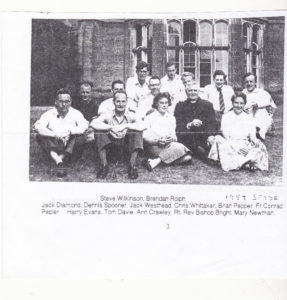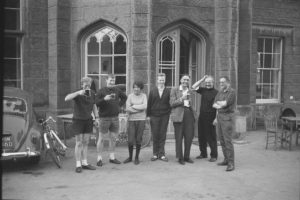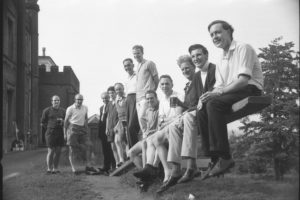The National Club
Conception
Continental Guide Book produced by Carl Ehrenzeller 1953, *** “Land marks in the history of the Club”.
In 1931 a party of Birmingham touring cyclists approached the C.T.C. with a view to form a Catholic Section.They were advised by the C.T.C. Midland Committee to form their own Club and Mr.A.T. Flynn of St. Vincent’s Boy’s Home took up the matter .The first run as a Club took place on 14th August 1932. Mr Flynn ruled that it should be a Catholic Club. On the 15th February at a general meeting the name was changed to Birmingham Catholic Cycling Club. His Grace Archbishop Williams passed the rules.
1934 Kidderminster section started.
1935
25th January Miss Veronica Floate had a notice inserted in the “Universe” and two weeks later St. Christophers Cycling Club was formed in London.
27th March The name changed to St. Christopher’s Catholic Cycling Club.
14th April Glasgow Section formed.
Easter. First Inter Section Rally at Oxford. Sections were regularly meeting together, Ilmington, Oxford and Pilgrimage to Canterbury.
1936
Easter, Rally and pilgrimage to Walsingham,Ireland member represented.
3rd July Bill Brittain proposed to present a cup for National competition for the fastest 25 mile Time Trial with the object of stimulating interest between the Sections at National Rallies. The provisional rules were drawn up.
11th and 12th Midlands join London at a Rally at Oxford.
1937
Bill Brittain starts Sections in Peterborough and Corby.
5th November, Bernard McLinden of London, having undertaken a cycle pilgrimage to Rome and received a Papal Blessing, presented the Illuminated Address to St. Christophers.
Following his move to Liverpool with his amazing energy and enthusiasm for the idea of a National Club, he commenced with press notices, and then made visits to the Nortern Towns and Cities The result was that many new Sections were founded..
1938
Easter. Cycling pilgrimage to Walsingham.
Sections started in Leeds, Liverpool, Bradford, Plymouth, Newcastle on Tyne. Bolton, Manchester and North Staffs.
1939
Rallies at Oxford,
Easter. Cycling pilgrimage to Walsingham.
Whitsun. Cambridge Rally, First National Conference proposed at Nuneaton.
2nd July Buxton Rally. First National Conference, Peter Lynch elected National Secretary.
30th July First organised pilgrimage to Lourdes, Paddy Murray led a group of 17 members from sections around the country.
1941
Hon. National Secretary, Peter Lynch killed in action.
1946
30th March Thurrock section formed.
Easter Rally and Conference at Newcastle under Lyme organised by North Staffs. Section. Refer to “The Second Conference of St. Christopher”
Club tour to Ireland
1947
Easter Rally at Soli House, Stratford on Avon. National Secretary reported that His Eminence Cardinal Griffin had been pleased to accept the patronage of the Club.
His Lordship Bishop Bright and Father Copsey act as arbitrators on the non Catholic membership question which had cropped up in the sections.
*** Information from a continental guide book prepared by Carl Ehenzeller. This included a directory of continental churches and Mass times in Austria, Bicycle Vocabulary in six languages . St. Christopher’s Catholic Cycling Club:- Aims, Benefits, Sections, Conferences and Rallies, Tourist Trophy, Bill Brittain Cup, Landmarks in the history of the Club.
Growing Pains
Following on from the Second Conference the path was far from smooth. The chairman Freddie Brown (North Staffs.) and Carl Ehrenzellar (Birmingham) did not get on. Carl a very experienced cycle tourist organised two very successful foreign tours for members of the Club: Province of Munster May 1946 (396 miles), Tour of Switzerland, July 1947 (410 miles) and a Pilgrimage to Rome in 1953.
Freddie a runner up in the R.T.T.C. Best All Rounder competition with his previous club Potteries in 1939 and an accomplished track rider was a staunch supporter of the National Cycling Union. There were disputes on the provision of insurance, the election of delegates to the National Committee and the number of non Catholics allowed in the Club. In 1944 North Staffs had two non Catholics and at the Stratford Rally in 1946, 10% was agreed upon.
During the 7 year period from 1946 to 1953 information is sparse and North Staffs appeared to have little involvement. Successful tours were being organised by Carl whilst National honours in racing were gained by North Staffs members notably Pauline Tiernan and Roy Swinnerton. By March 1952 North Staffs had offered resignation only to be withdrawn by December when the Chairman J. Culshaw. Liverpool welcomed them back. Difficulties relating to correspondence were gradually overcome and the voluntary exile of North Staffs ended.
Jack Westwood Nelson and National Secretary set out to mend fences by visiting Sections. In 1955 the National Insurance Scheme was no longer compulsory and sections were able to put forward candidates for office on the National Committee. J. Culshaw (Liverpool) was Chairman from 1947 to 1952, C. Ehrenzellar (Birmingham) President from 1948 to 1952.
Golden Years
The Easter Rally was organised by different Sections and in different parts of the country annually. Liverpool Section organised the Rally at New Brighton in 1953. Where as in 1939 36 members from 5 sections attended by 1953, 75 members from 10 sections attended and by 1960 at Buxton no less than 16 sections were present. These riders would compete for honours in the time trials and later in road races. A significant additional number would go on the organised touring rides, take part in the Tourist Competition and join in the social activities. There would be an Easter Mass and get together with evening meal and prizes.
The events were coordinated by the National Committee which met regularly at Spode House, Hawkesyard Priory near Rugeley, the home of the Dominican Order. A keen interest was taken by the Church. Sections had no difficulty in appointing spiritual advisers as some curates, were keen cyclists. The Bishop was very supportive and often attended the National Conference and the Annual Dinner and Prize Presentation at the end of the year.
The National Club was now a major organisation within the cycling world. There were sections all over the country and members involved in all activities of cycling life. Riders were prominent in the promotion and organisation of events at all levels, together with their participation socially and competitively. The National Committee had responsibility for the recording of racing and touring competition results and through the magazine “Rota” all sections obtained publicity. In addition third party insurance could be arranged and the Club handbook listed all the rules, section officials, addresses, and records. There was also a list of Mass times at churches adjacent to Youth Hostels for the convenience of touring cyclists.
The Club had riders competing in events at section, district, regional, national and international level. An exhaustive list of honours and records is available on the site. Refer to “Roll of Honour“, “Records“, “Awards“, “National Rally” and” Time Trial Records“.
National Officials
Officers and representatives were nominated by the Sections to form the National Committee. The Officers were elected at the National Conference to serve for one year and provide services to the Sections.
The Organisation would take the following form:
Patron, President and Spiritual Director.
Vice Presidents.
Chairman, Secretary , Treasurer, Insurance Secretary, Time Trial Secretary, Road Racing Secretary, Rota and Handbook Editor, Public Relations Officer, Touring Secretary, Private Members Secretary and Assistant Secretary.
Notable Officials from 1939 until 1969 are listed:
-
-
- 1939 – P. Lynch, Secretary
- 1946 – F.T. Brown, Chairman
- 1947 – Cardinal Griffin, Patron, J. Culshaw, Chairman
- 1948 – Cardinal Griffin, Patron, C. Ehrenseller, President, J. Culshaw, Chairman
- 1949 – Cardinal Griffin, Patron, C. Ehrenseller, President, J. Culshaw, Chairman
- 1950 – Cardinal Griffin, Patron, C. Ehrenseller, President, J. Culshaw, Chairman
- 1951 – Cardinal Griffin, Patron, C. Ehrenseller, President, J. Culshaw, Chairman
- 1952 – Cardinal Griffin, Patron, C. Ehrenseller, President, J. Culshaw, Chairman
- 1953 – Cardinal Griffin, Patron, J. Culshaw, Chairman
- 1954 – Cardinal Griffin, Patron, J. Culshaw, Chairman
- 1955 – Cardinal Griffin, Patron, J. Culshaw, Chairman
- 1956 – Cardinal Godfrey Patron, Bishop Bright President
- 1957 – P Molyneux (Liverpool) was elected Chairman and Jack Westhead, Nelson, Secretary. T. Rawlinson, Editor
- Harry Evans took over the chair during this period when the records are not available.

- Meeting at Spode 1957
- 1958 – Unknown
- 1959 – Unknown
- 1960 – Harry Evans (North Staffs.) Chairman, Steve Wilkinson, Secretary, Frank Hughes, Editor
- 1961 – Harry Evans (North Staffs.) Chairman, Steve Wilkinson, Secretary, Frank Hughes, Editor
- 1962 – Harry Evans (North Staffs.) Chairman, Steve Wilkinson, Secretary, Frank Hughes, Editor
- 1963 – Harry Evans (North Staffs.) Chairman, Steve Wilkinson, Secretary, Frank Hughes, Editor
- 1964 – Cardinal Heenan, Patron, Conrad Pepler, Spiritual Advisor, Maurice Perrin, Private Member, Secretary Frank Hughes (Manchester) Editor
- 1965 – Cardinal Heenan, Patron, Conrad Pepler, Spiritual Advisor, Maurice Perrin, Private Member, Secretary Frank Hughes (Manchester) Editor
- 1966 – Cardinal Heenan, Patron, Conrad Pepler, Spiritual Advisor, Maurice Perrin, Private Member, Secretary Frank Hughes (Manchester) Editor
- 1967 – John Newman, Private Member, Chairman
- 1968 – John Newman, Private Member, Chairman
- 1969 – Gordian Marshall, Spiritual Director
-
National Committee meeting at Spode House 1968.
L. to R. – Maurice Perrin, Private Member, Secretary, Pat Kenny, Birmingham, Time Trial Secretary, Barbara Winstone, Coventry, Mike O’Meara, Surrey, Treasurer John Newman, Private Member, Chairman, Father Conrad Pepler, Spiritual Director, Spode House. Pete Burley Bootle, Road Race Secretary.
Photo: J Cunningham.
National Committee meeting at Spode House 1969.
L.to R. – Tom Greep, Liverpool, Peter Hambley, N Staffs, Touring Secretary, John Penn, Private Member, Insurance Secretary, Tim Yates, N Staffs, Frank Hughes, Manchester, Rota Editor, John Newman, Private Member, Chairman, Mick O’Meara, London,Treausurer , Brian Cummings, Surrey, Road Race Secretary Vin Dilger, Manchester, Maurice Perrin, Private Member, Secretary, Dusty Rhodes, Keighley, Fr Gordian Marshall OP, Spiritual Director
Photo: J Cunningham.
Troubled Times
Cycling Clubs were invariably centred in city districts, towns and villages where they competed with each other for members. Older members would look after young riders until they were ready to enter junior competitions. Competition between the clubs was intense and a district might have up to 20 clubs, one of which may well have been St. Christopher’s – the Club having more than forty sections around the country in the 1950s.
Club runs and touring were still very popular but racing attracted more and more riders. They could compete in time trials, massed start racing, cyclo cross, grass and hard track races. Specialisation became more common in the 1970s and sponsorship was available to the most successful clubs. Quality racing vests with appropriate advertising for the company or business, equipment and some assistance with travelling expenses was offered to selected riders. This was allowed by the governing racing bodies without loss of amateur status and enabled some riders to compete in prestigious events outside the local area.
Ambitious riders would move to the clubs where they could get the most support. This led to larger clubs dominating an area with fewer smaller clubs concentrating on younger members. In 1970 a typical situation occurred in North Staffs. where Stoke on Trent City Council offered sponsorship and facilities to athletics and cycling. The St. Christopher’s riders were split; short distance and track riders moved to Stoke A.C. whilst the long distance riders remained. This was made possible by the support and sponsorship of a founder member Mark Coupe who ran a very successful building company. In spite of recruiting drives the haemorrhage of riders from the clubs continued.
It was possible to succeed only with strong junior sections where the parents were involved. Roy Swinnerton Cycles supported the junior riders in North Staffs. At National level this situation prompted much debate about the constitution and name of the Club. A motion to open up the membership and change the name to St, Christopher’s Christian Cycling Club failed. Although the ecumenical movement was flourishing after Vatican II President Bishop Cleary did not think the time was yet right.
In 1971 Harrogate section merged with Harrogate C.C. to make a new club Nova C.C. Leeds followed by dropping the word “Catholic”. During the 1970s the number of sections reduced and at the 1979 Spode Conference only three sections London, Coventry, Manchester and the Private Members were represented on the National Committee. By 1982 There were 7 sections with a membership of 109 outside of London. The members were dispersed throughout the country in Glasgow, Jarrow, Haverfordwest, Manchester, North Staffs., Birmingham and Coventry.
Bishop Cleary was very supportive but the National Committee was still lacking a Spiritual Director and Spode House became less of a draw. London Section was thriving and the majority of posts on the National Committee were filled by London members. London proposed a change in the constitution and a new name “St. Christopher Catholic Cycling Association”.
The National Committee disbanded and soon after Glasgow dropped the word “Catholic”. Some Sections continued to enjoy their cycling but the competition, dinners and social gatherings at a National level ceased.
National Officials:
-
- 1970 – Cardinal Heenan, Patron, Gordian Marshall, Spiritual Director, Maurice Perrin, Private Member , Secretary. Mick O’Meara, London,Treasurer , Frank Hughes Manchester , Editor. Brian Cummings Surrey, Road Race Secretary.
- 1971 – Bishop Cleary, President, Matthew Rigney, Spiritual Director, John Newman, Private Member, Chairman, T. Yates North Staffs. Treasurer, Peter Hambley, N Staffs, Touring Secretary, John Penn, Private Member, Insurance Secretary, P. Kenny Birmingham, Time Trial Secretary, V. Myers Manchester, Editor J. Cunningham London, Public Relations Officer, J. Gabbitas Private Members Secretary, Katherine Perrin, Private Members Assistant Secretary.
- 1972 – Unknown
- 1973 – Conrad Pepler, Spiritual Advisor, John Cunningham, Editor
- 1974 – John Westhead, Editor
- 1975 – M. Smith London, Time Trial Secretary, T. O’ Byrne London, Touring Secretary, J Brennan London, Public Relations Officer
- 1976 – M. Smith London, Time Trial Secretary, T. O’ Byrne London, Touring Secretary, J Brennan London, Public Relations Officer
- 1977 – John Cunningham,Secretary
- 1978 – Cardinal Hume, Patron, Conrad Pepler, Spiritual Advisor, Maurice Perrin, Private Member, Chairman, Michael Perrin Private Member, Treasurer, B. Imber London, Touring Secretary, J. Killick London, Public Relations Officer, T. Cochrane Coventry, Private Members Secretary, Peter Hambley, Editor, Steve Wilkinson, Printer
- 1979 – Sean Macken, Chairman
- 1980 – Maurice Perrin, Chairman, Tom Cochrane, Editor
- 1981 – George Thurmer London, Chairman, Sean Macken London , Secretary, John Cunningham, Editor
- 1982 – Unknown


